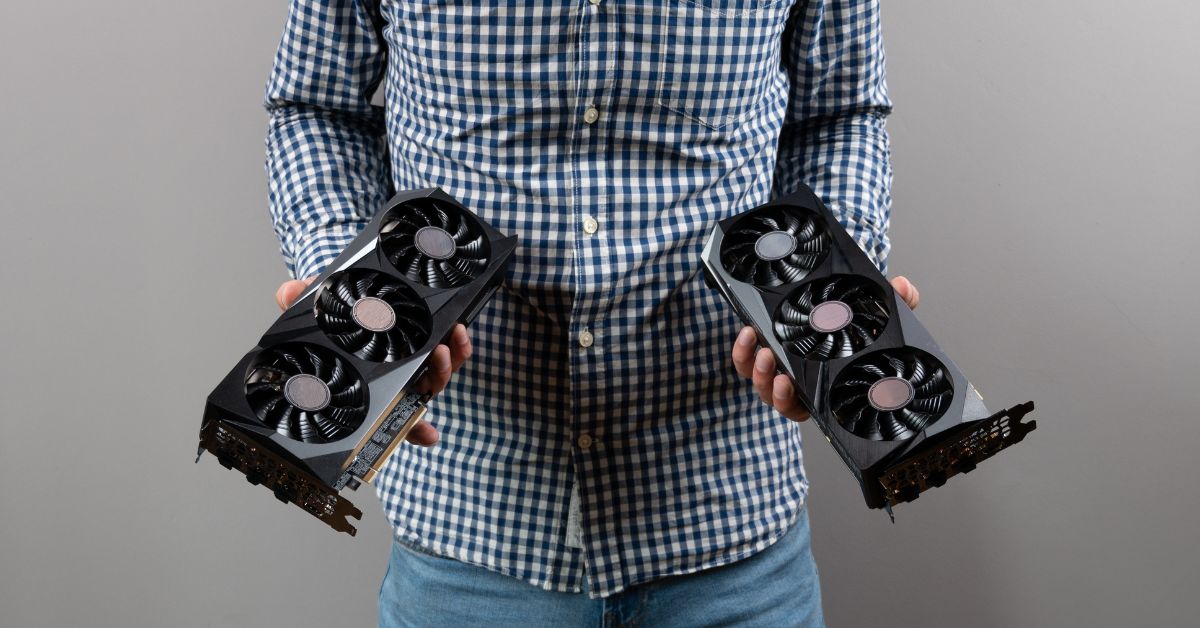When it comes to choosing the correct power supply unit or PSU for your computer, you have to factor in multiple components. And one of the biggest aspects is the specific GPU you are utilizing. Nvidia’s RTX series of GPUs are extremely popular right now. The question is, how much power do these GPUs require?
In this article, we are going to go over each of the RTX series of GPUs and their recommended power supply, starting from RTX 3050. We will look at how much power you will need to run a specific RTX unit in a specific PC build.
RTX 3050 Power Consumption and Requirements
So, now that we have the basic factors for selecting an adequate power supply unit down, let’s look at some specific GPUs. For this calculation, we are going to look at a top-tier PC built using an RTX 3050 GPU.
The RTX 3050 GPU consumes 130 watts at peak usage. Meaning this is the power you have to supply when you are running the GPU to its fullest capacity.
Now, let’s assume that you have the following setup:
- Intel Core i9 – 241 watts
- RTX 3050 – 130 watts
- Motherboard – 80 watts
- 2.5” SSDs – 36 watts
- 2 CPU fans – 12 watts
- 3 case fans – 18 watts
This is a pretty standard configuration for a gaming PC that utilizes a 3050 GPU. The total power consumption comes out to about 520 watts. If you were using a lesser process, say intel i5m, the total peak power for your PC would be around 400 watts. Of course, there are other smaller components that also need power.
So, for the PC with a top-level process, you should look for a power supply anywhere between 600-650 watts. This will give you plenty of overhead to work with. And if you are running the RTX 3050 with an intel i5 process, then you would ideally want a PSU with a peak power rating between 500 to 550 watts.
Keep in mind that this calculation has been done using a peak power rating. Meaning your PC will not consistently be running at this power level. But when and if it does, your PSU should be capable enough to supply the necessary power to keep the system going without crashing and burning.
RTX 3060 Power Consumption and Requirements
Unsurprisingly, the RTX 3060 model consumes more power than the 3050 version. In this case, the RTX 3060 has a peak power consumption of 170 watts, which is a full 40 watts higher than the previous version.
So, let’s put this GPU in a standard gaming PC setup and see how much power the entire system will require:
- Intel Core i9 – 241 watts
- RTX 3050 – 170 watts
- Motherboard – 80 watts
- 2.5” SSDs – 36 watts
- 2 CPU fans – 12 watts
- 3 case fans – 18 watts
The total power consumption adds up to an estimated 560 watts. This is the peak power this PC will consume when running at full capacity. And if you were to use a mid-range process such as an intel i5, then the power consumption adds up to 442 watts.
So, to run the RTX 3060 GPU in this PC built, you should get a power supply unit capable of providing 650 to 700 watts.
RTX 3070 Power Consumption and Requirements
Now, let’s look at the RTX 3070 GPU. Now, the 3070 families of graphics cards have 2 different iterations. You have the normal RTX 3070 and then you have the RTX 3070Ti. The RTX 3070 has a peak power consumption rating of 220 watts. In contrast, the RTX 3070Ti version has a peak power rating of 290 watts. So, the difference is substantial.
This is 50 and 120 watts more than the previous 3060 series respectively. Once again, let’s put both graphics cards inside a standard PC setup:
- Intel Core i9 – 241 watts
- RTX 3070/3070Ti – 220/290 watts
- Motherboard – 80 watts
- 2.5” SSDs – 36 watts
- 2 CPU fans – 12 watts
- 3 case fans – 18 watts
In this instance, the total estimated power consumption adds up to 607 watts for the regular 3070 and 677 for the 3070Ti.
So, the recommended power supply for the 3070 model is about 750 watts and for the 3070Ti, it is 800 to 850 watts. Remember that this added power rating will allow room for future upgrades.
You may have noticed that the power buffer is increasing as the GPUs become more powerful. That is because a PC with a more advanced GPU and power supply will also require a more powerful cooling system. And this cooling system will draw in additional power from the supply.
RTX 3080 Power Consumption and Requirements
The RTX 3080, similar to the 3060 and 3070, has two different versions. But unlike the previous two, RTX 3080 and 3080Ti both have the same power consumption rating. Both versions have a power draw of around 350 watts. So, you can use one to estimate the required power level of the other.
- Intel Core i9 – 241 watts
- RTX 3050 – 130 watts
- Motherboard – 80 watts
- 2.5” SSDs – 36 watts
- 2 CPU fans – 12 watts
- 3 case fans – 18 watts
Once again, we have put the RTX 3080 GPU in a standard gaming PC with a high-end processor. To run this system, you need at least 740 watts of power. So, the ideal power supply for this unit should be in the region of 850 or 900 watts.
RTX 3090 Power Consumption and Requirements
The RTX 3090 family of graphics card units also comes in two different versions. While the regular 3090 consumes about 350 watts, the 3090Ti version has a peak power consumption of 450 watts. This is a drastic increase of 100 watts between the two models. As such, the power supply required for both will vary quite significantly.
So, let’s look at the power required to run this family of GPUs in a standard gaming PC setup:
- Intel Core i9 – 241 watts
- RTX 3090/3090Ti – 350/450 watts
- Motherboard – 80 watts
- 2.5” SSDs – 36 watts
- 2 CPU fans – 12 watts
- 3 case fans – 18 watts
If you are running an RTX 3090 in this setup, the total power consumption at peak usage comes out to 737 watts. And if you are running the RTX 3090Ti in this setup, the power consumption adds up to 837 watts.
So, for the regular 3090 version, you should look for a PSU with a power rating of around 900 watts. And if you are planning on using the 3090Ti version, then you would need a PSU in the region of 950 to 1000 watts. Remember, the more advanced the PC build, the more power you will need to run an effective cooling system. Thus, you need more additional power.
| RTX Series | Processor | Recommended Power Supply |
|---|---|---|
| 3050 | Intel i9-10900K | 600 to 650 watts |
| 3060 | Intel i9-10900K | 700 to 750 watts |
| 3070/3070Ti | Intel i9-10900K | 750/850 watts |
| 3080/3080Ti | Intel i9-10900K | 850 to 900 watts |
| 3090/3090Ti | Intel i9-10900K | 900/1000 watts |
How to Choose the Correct PSU for Your Computer?
Choosing the right power supply for a computer is vital. Yet it is an aspect of PC purchasing that gets frequently overshadowed by more glamorous hardware such as the RAM, the CPU (central processing unit), and the GPU (graphics processing unit).
But an ideal power supply unit is necessary to ensure these other components perform at a high level and for a long time. So, let’s look at some of the factors you need to consider before you make this purchase:
Power Consumption
“How many watts?” – This is easily the most common question people ask when buying their power supply unit. The answer is pretty straightforward. Your power supply has to provide enough watts that are equal to or more than the power consumed by the rest of your PC.
Since different PC builds have different power requirements, there really is no one answer for every build. You have to figure out the power rating for each of the major components and add them up. So, you need to know the power rating of your motherboard, CPU, GPU, RAM, hard drive, optical drive, cooling systems, etc.
Then you need a PUS that can supply at least that amount of power to your PC. This will allow you to run your computer without having it instantly shut down due to a lack of power.
Always Have Surplus
So, let’s say you have a PC that has a total power consumption of 500 watts (a common rating for a typical gaming PC). Does this mean you should get a PSU of 500?
No, you should get a PSU that is able to provide more than 500 watts. This is because of safety. See, if your PC has a power consumption of 500 watts, it does not mean it will need 500 watts all the time. It will consume less when you are operating at a normal pace. The 500 watts will come into play when you are pushing your PC to the maximum.
And this maximum number also applies to PSUs. If the power rating for your PSU is 500 watts, then it means that the maximum power it can output is 500 watts. But this is only for a short amount of time. So, if you continue to operate your PC at its fullest potential, the continuous demand for that maximum power can and will lead to a damaged PSU.
So, it is always best to err on the side of caution by getting a PSU with a power rating that is higher than the exact number you need. This will ensure that your PSU will not overheat and/or burn when there is a sudden overload of power.
So, for example, if your PC requires 500 watts, then you should get a PSU with a rating of 600 to 650. Having this overhead will also allow you to upgrade your PC in the future much easier. You would be able to simply upgrade your CPU or GPU without needing an entirely new PSU.
Proper Protection
Your power supply is susceptible to any sudden surge of electricity, just like most electrical equipment. So, the PSU needs to have certain mechanisms for this type of scenario. Otherwise, the power surge can not only damage your PSU, but also other, more valuable components of your PC.
This is why features such as OVP and short circuit protection are extremely beneficial. These additional circuits can detect sudden, dangerous fluctuations in the AC power supply. If the voltage or current reaches a certain level, then these mechanisms will stop the flow entirely, protecting your PC.
A good PSU will have these features built-in. Additionally, it can be very wise to invest in a surge protector for your PC. This may drive up the cost in the immediate time. But in the long run, it can save you from massive repair costs.
Conclusion
Having the appropriate power supply for your PC is essential for both high performance and longevity. Even if the initial investment appears expensive, it will be more than worth it in the long run.


